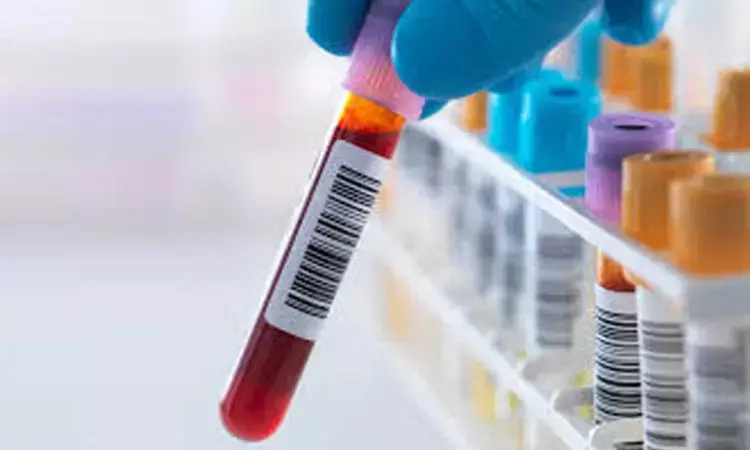- Home
- Medical news & Guidelines
- Anesthesiology
- Cardiology and CTVS
- Critical Care
- Dentistry
- Dermatology
- Diabetes and Endocrinology
- ENT
- Gastroenterology
- Medicine
- Nephrology
- Neurology
- Obstretics-Gynaecology
- Oncology
- Ophthalmology
- Orthopaedics
- Pediatrics-Neonatology
- Psychiatry
- Pulmonology
- Radiology
- Surgery
- Urology
- Laboratory Medicine
- Diet
- Nursing
- Paramedical
- Physiotherapy
- Health news
- Fact Check
- Bone Health Fact Check
- Brain Health Fact Check
- Cancer Related Fact Check
- Child Care Fact Check
- Dental and oral health fact check
- Diabetes and metabolic health fact check
- Diet and Nutrition Fact Check
- Eye and ENT Care Fact Check
- Fitness fact check
- Gut health fact check
- Heart health fact check
- Kidney health fact check
- Medical education fact check
- Men's health fact check
- Respiratory fact check
- Skin and hair care fact check
- Vaccine and Immunization fact check
- Women's health fact check
- AYUSH
- State News
- Andaman and Nicobar Islands
- Andhra Pradesh
- Arunachal Pradesh
- Assam
- Bihar
- Chandigarh
- Chattisgarh
- Dadra and Nagar Haveli
- Daman and Diu
- Delhi
- Goa
- Gujarat
- Haryana
- Himachal Pradesh
- Jammu & Kashmir
- Jharkhand
- Karnataka
- Kerala
- Ladakh
- Lakshadweep
- Madhya Pradesh
- Maharashtra
- Manipur
- Meghalaya
- Mizoram
- Nagaland
- Odisha
- Puducherry
- Punjab
- Rajasthan
- Sikkim
- Tamil Nadu
- Telangana
- Tripura
- Uttar Pradesh
- Uttrakhand
- West Bengal
- Medical Education
- Industry
New low cost and simple test for prenatal detection of alpha-thalassemia

Philadelphia - In a report in The Journal of Molecular Diagnostics, published by Elsevier, researchers describe a rapid, accurate novel assay for nondeletional alpha-thalassemia genotyping based on one-step nested asymmetric PCR melting curve analysis, which may enhance prenatal diagnosis, newborn screening, and large-scale population screening.
Thalassemia is a group of inherited blood disorders that reduces the ability of blood to circulate oxygen throughout the body. The severity can vary from benign to life threatening; therefore, it is important to identify infants as early as possible who may develop thalassemia-associated symptoms, as well as parents who are carriers. This requires the availability of practical and precise molecular diagnostic tools.
"The nondeletional alpha-thalassemia genotyping assay developed in this study has the advantages of one-step closed-tube operation, high-throughput, speed, and automation, which can meet the methodological needs of a control program for thalassemia in large-scale populations," explained Wanjun Zhou, PhD, of the Department of Medical Genetics, School of Basic Medical Sciences, Southern Medical University, Guangzhou, China.
Dr. Zhou noted that the strategy of one-step nested asymmetric PCR melting analysis overcomes the bottlenecks of high homology and GC-rich secondary structure that limited previous types of analyses.
Thalassemia affects up to five percent of the world's population. These disorders are characterized by low levels of hemoglobin, decreased red cell production, and anemia. Patients with thalassemia report fatigue, weakness, shortness of breath, dizziness, or headaches. One subtype, alpha-thalassemia, is caused by one or more mutations in two different genes (HBA1 and HBA2) associated with production of the alpha-globin subunits of hemoglobin. Every individual has two copies of these genes, so up to four genes can be affected; this can determine the severity of symptoms and carrier status. Though the most common type of genetic mutation associated with alpha-thalassemia is deletional (removal of a section of the gene sequence), the assay in this case focuses on point, or nondeletional, mutations.
The researchers tested the ability of the new assay to detect five nondeletional alpha-thalassemia mutations. All five mutations were accurately identified with a concordance rate of 100 percent in a blind analysis of 255 samples with known genotypes, as determined by other analytic methods including gap- PCR, PCR-reverse dot blot (RDB), or Sanger sequencing.
The investigators also tested the capability of the new assay to screen large populations. After testing 1,250 blood samples, the assay showed 100 percent sensitivity and specificity for all of the targeted mutations.
The overall analysis time with the new assay was just under 2.5 hours. This is considerably faster than other molecular genetic testing methods, such as Sanger sequencing, which require 380 minutes, or RDB, which takes 300 minutes.
"These other methods are unsuitable for use in large-scale screening programs because they have limitations such as cumbersome operation, low throughput, subjective interpretation, and possible laboratory contamination caused by post-PCR open-tube operation," commented Dr. Zhou. "Our results prove that this new assay is accurate, reliable, simple, and rapid and can meet the requirements for clinical diagnosis and mass screening of nondeletional alpha-thalassemia." He believes the same strategy may be used in the future for rapid genotyping of other genetic mutations.
For more details click on the link: http://dx.doi.org/10.1016/j.jmoldx.2020.03.002
Hina Zahid Joined Medical Dialogue in 2017 with a passion to work as a Reporter. She coordinates with various national and international journals and association and covers all the stories related to Medical guidelines, Medical Journals, rare medical surgeries as well as all the updates in the medical field. Email: editorial@medicaldialogues.in. Contact no. 011-43720751
Dr Kamal Kant Kohli-MBBS, DTCD- a chest specialist with more than 30 years of practice and a flair for writing clinical articles, Dr Kamal Kant Kohli joined Medical Dialogues as a Chief Editor of Medical News. Besides writing articles, as an editor, he proofreads and verifies all the medical content published on Medical Dialogues including those coming from journals, studies,medical conferences,guidelines etc. Email: drkohli@medicaldialogues.in. Contact no. 011-43720751


